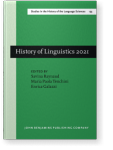Table of contents
Foreword and acknowledgements
Editors’ introduction
Part 1.General and particular issues in the history of linguistics
Chapter 1.Can linguistics and historiography of linguistics profit from each other?
Chapter 2.Type or descent? The philosophical, romantic, and biological sources of typology in Soviet linguistics of the 1920s–1940s
Chapter 3.Le futur antérieur des linguistes (fin 19e–début 20e siècle)
Chapter 4.Ethics and language in (and around) Philipp Wegener
Chapter 5.Walter Benjamin’s idea of language
Chapter 6.Eléments pour une histoire de l’interprétation: Considérations méthodologiques, enjeux et perspectives
Chapter 7.“Computational linguistics” as the horizon of projection of early machine translation
Part 2.Antiquity
Chapter 8.Declension and description: The ways of Sanskrit Grammarians
Chapter 9.Constituent-order in Sanskrit Bahuvrīhi compounds: The role of the qualifier
Chapter 10.The internal order of Sanskrit compounds: A dialogue between Pāṇini and generative grammar
Part 3.Sixteenth to twentieth century works
Chapter 11.How far are the horizons of descriptive linguistics?
Chapter 12.Relevance of the work of B. Delbrück on Indo-European syntax (a century after his death)
Chapter 13.Three documents bearing on the foundation of the Linguistic Society of America in the age of scientific racism
Chapter 14.Archival resources for the study of the historiography of American linguistics
Chapter 15.Courses in general linguistics by Roman Jakobson at the École Libre des Hautes Études
Chapter 16.Contribution de Agostino Gemelli (1878–1959) à l’analyse des variations phoniques du langage
Chapter 17.The structuralist quest for general meanings: Mapping the history of monosemy in grammatical semantics
This content is being prepared for publication; it may be subject to changes.
